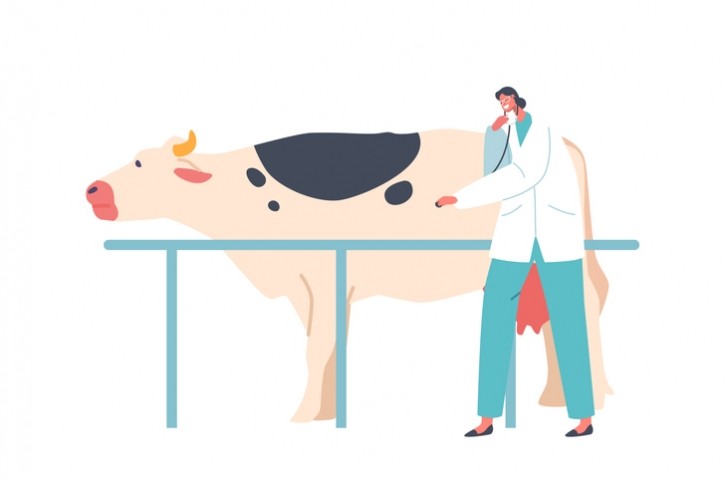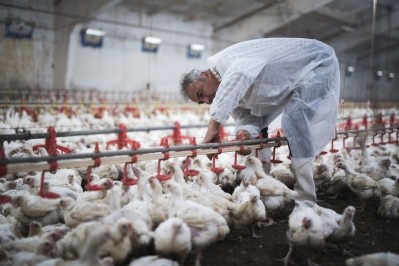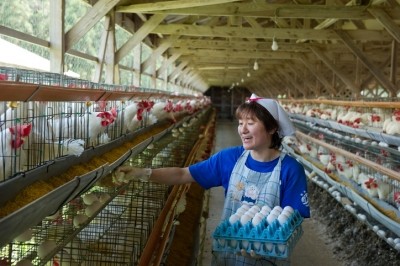UK invests £9m in fight against endemic livestock disease

The investment forms part of an £11.5m multi-phase flagship project to revolutionize the UK livestock sector, which commenced in 2021. It seeks to transform the UK livestock sector by improving farm productivity as well as the health and welfare of UK herds by reducing the burden of endemic disease, while also seeking to minimise the environmental impact of the livestock sector.
Along with BBSRC and Defra, the initiative is backed Northern Ireland’s Department of Agriculture, Environment and Rural Affairs (DAERA) and the Scottish government. The agrifood and animal-health industries, farmers, vets, diagnostic laboratories, and policymakers are also involved in the research.
Those behind it say that, to date, the scheme has facilitated the formation of 45 new industry partnerships, and has engaged with 170 end-users including farmers, veterinarians, and policymakers to ensure that the research outcomes directly address their practical needs.
Phase two of the initiative is set to kickstart this summer, with a total of 14 projects spanning pig, poultry, beef, sheep, and dairy production, receiving funding. Nine of the projects incorporate technologies to advance disease monitoring, diagnosis, and prevention.
Gut microbiome, AI, omics
Among the projects being back is one being run by Scotland's Rural College, exploring the use of forestry by-products as novel therapeutics for parasite control in livestock. Further research being back includes work at the University of Nottingham aimed at monitoring the gut microbiome in broiler chickens via artificial intelligence (AI) and omics.
AI is also being used in another project that has secured financing under this scheme, whereby researchers at the University of Bristol will monitor changes in social behavior to enable early detection of disease in dairy cattle. A team at the University of Liverpool is being funded to explore how to prevent reductions in egg production in UK free-range flocks through understanding the interactions between farm practices, flock coinfections and immunity.
Driving a more sustainable agrifood sector
Two other projects involve partnerships between Queen’s University and the Agri-Food and Biosciences Institute (AFBI).
Those partners said: “The successful bids mark a major boost for the Queen’s-AFBI Alliance, which seeks to drive a more sustainable agrifood sector by pooling expertise, resources and research capability in NI and providing UK and international leadership in response to major challenges in agriculture and food security.”
One of those projects will focus on endemic infections in ruminant livestock, while the other will be concerned with commercially farmed chicken health and welfare.
The Co-Adapt project will be led by Professor Eric Morgan and Prof Ilias Kyriazakis of the Institute for Global Food Security and School of Biological Sciences at Queen’s University. It seeks to better understand and manage co-infections in livestock, focusing on gastrointestinal disease in sheep and cattle.
Prof Morgan from Queen’s said Co-Adapt “will determine how altered timing of infections as a result of climate warming is giving rise to new parasite and pathogen combinations and develop methods to manage them successfully in an era of increasing drug resistance.”
The second project, Runting Stunting Syndrome in Broilers, will be led by Dr Victoria Smyth from AFBI to investigate stunting in broiler flocks, a condition with a significant impact on the poultry industry.
Dr Smyth said the study will use “novel, ground-breaking methods and technologies supported by established scientific expertise to study this condition which is responsible for substantial welfare and economic consequences in broiler flocks in the UK.”
The 14 projects being funded include:
- Forestry by-products as novel therapeutics for parasite control in livestock. Principal Investigator: Dr Spiridoula Athanasiadou, Scotland's Rural College
- Monitoring the gut microbiome via AI and omics: a new approach to detect infection and AMR and to support novel therapeutics in broiler precision farm. Principal Investigator: Dr Tania Dottorini, University of Nottingham
- AI to monitor changes in social behavior for the early detection of disease in dairy cattle. Principal Investigator: Professor Andrew Dowsey, University of Bristol
- Preventing drops in egg production in UK free-range flocks: understanding the interactions between farm practices, flock coinfections and immunity. Principal Investigator: Dr Kannan Ganapathy, University of Liverpool
- Next generation vaccines for bovine respiratory disease complex utilizing virus vaccine vectors to target both bacterial and viral pathogen. Principal Investigator: Dr William Golde, Moredun Research Institute
- Precision solutions for controlling fasciolosis in sheep. Principal Investigator: Dr Rhys Jones, Aberystwyth University
- Digital platform for sustainable health: a step change in reducing endemic disease in dairy cattle. Principal Investigator: Professor Jasmeet Kaler, University of Nottingham
- CO-ADAPT: adaptive management of endemic coinfections in ruminant livestock under climate change. Principal Investigator: Professor Eric Morgan, Queen's University of Belfast
- A UK platform for the control of bovine viral diarrhea: application of a novel disease simulation model to guide program development and policy design. Principal Investigator: Dr Luke O'Grady, University of Nottingham
- Genetic and management solutions for lameness-associated endemic diseases in dairy cattle. Principal Investigator: Professor Georgios Oikonomou, University of Liverpool
- Unravelling the aetiology of stunting in UK broiler flocks through the use of novel microdissection and viral meta-transcriptomic sequencing tools. Principal Investigator: Dr Victoria Smyth, Agri-Food and Biosciences Institute
- Protecting pigs from enzootic pneumonia: rational design of safe attenuated vaccines. Principal Investigator: Professor Dirk Werling, Royal Veterinary College
- Delivery of rapid diagnostic tests for sustainable control of parasitic diseases in sheep and cattle. Principal Investigator: Professor Diana Williams, University of Liverpool
- Effects of co-infections on Marek's disease in poultry and development of novel recombinant Marek's disease virus vector vaccines. Principal Investigator: Dr Yongxui Yao, The Pirbright Institute














